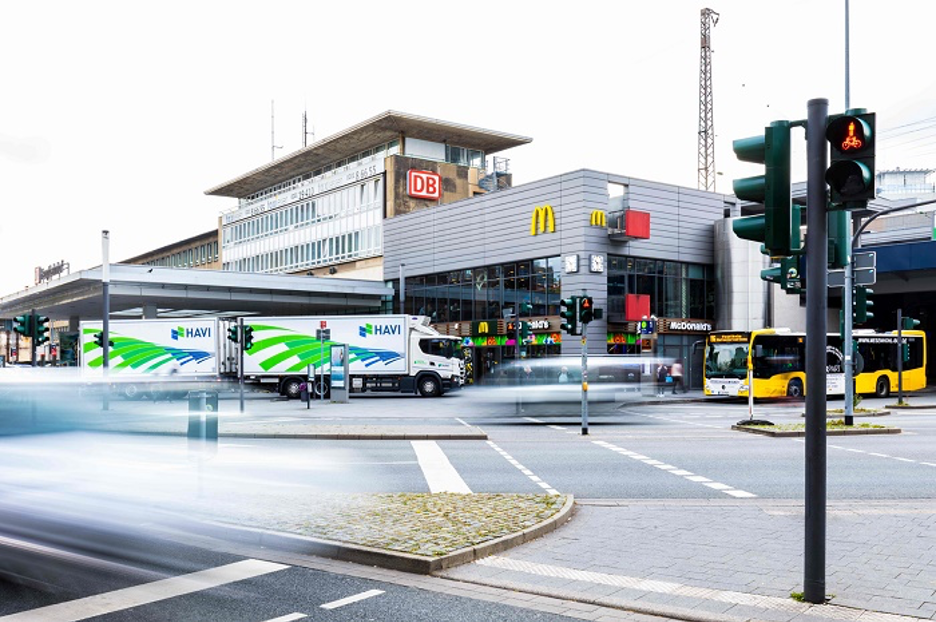Alternative Fuels Accelerate HAVI’s Sustainability Drive
HAVI is responding to the threat of climate change, diesel bans and low-emission zones by switching its delivery fleet in Germany to liquefied natural gas (LNG) and setting up its own network of LNG filling stations.

It is just six months since HAVI introduced its first LNG-powered delivery vehicles to the German market and they are already delivering measurable environmental benefits. Through its pioneering alternative fuels partnership with Scania, the supply chain business – whose customers include McDonald’s, KFC, Nordsee and Vapiano – recently switched another nine vehicles to gas at its Duisburg distribution center. By the end of June, its LNG fleet will comprise 35 trucks – one of the biggest in Germany.
And this is just the start. Under the slogan ‘Our Environment, Our Drive’, HAVI’s partnership with Scania is on track to transfer up to 70 percent of its truck fleet to alternative fuels by 2021 in several of the European countries where HAVI operates.
Delivering Significant Benefits
It is proven that alternative fuels such as LNG significantly reduce the environmental impact of road transport. LNG-powered trucks emit less CO2, nitrous gases and fine particles than petrol and diesel trucks – and they are much quieter. By going the alternative fuel route, HAVI is not only making supply chains more sustainable, but it is also ensuring deliveries to its customers continue for the foreseeable future as more towns and cities across Europe introduce anti-congestion measures, diesel bans and low-emission zones.
“For our customers, sustainable supply chains with the lowest emissions possible are becoming more and more important,” explains Roland Schmidt, Managing Director, HAVI Logistics, Germany. “With our LNG fleet, we are making our contribution towards ensuring our customers’ supply chains and products are sustainable and green.”
Partnerships Part 1: HAVI and McDonald’s
One such customer is McDonald’s, which is aiming to reduce global CO2 emissions in its restaurants, administration, production and supply chains by more than 30 percent by 2030 as part of its sustainability strategy. “Having worked closely together for a number of years, we have developed a similar understanding of what a sustainable business model really involves,” says Heike Bierweiler, Director of Supply Chain, Quality Assurance & Sustainability at McDonald’s. “The high level of innovation from our partners, suppliers and franchisees forms the foundation for the success of the whole McDonald’s System. The comprehensive measures implemented by our logistics partner to reduce CO2 emissions are a prime example of this, as HAVI’s innovative projects help us reach our global climate goals.”
Investing In A Sustainable Future
Environmental awareness has shaped the way HAVI does business since it started operating. With its one-stop shopping model, optimized route planning and multi-compartment refrigerated trucks, it continues to invest in a sustainable future by effectively cutting the number of kilometers its drivers travel each year. Switching to LNG will further reduce HAVI’s environmental impact while reinforcing its status as a leader in sustainable logistics. At the same time, regulators and legislators are making it easier for other businesses to follow HAVI’s example with welcome incentives such as tax breaks for switching from carbon-based fuels along with exemptions from HGV tolls until the end of 2020.
HAVI’s LNG Station Network
In November 2018, HAVI opened Germany's fourth LNG filling station in cooperation with its partner GasCom. Another HAVI LNG filling station in Wunstorf, near Hanover, is scheduled to come onstream at the start of 2020. “Germany’s national LNG filling station network is still developing slowly,” comments Torsten Oldhues, Senior Director, Distribution Logistics, HAVI. “So, opening our own stations was essential to the success of our alternative fuels strategy.”
By expanding its existing network, HAVI is also seeking to reduce the impact of changes in pricing policies by filling station operators. What’s more, the supply chain company will be in a position to offer other carriers the opportunity to use its filling stations. This will not only enable the stations to run at capacity but will also encourage other industry players to implement their own sustainable solutions. At HAVI’s Duisburg location, for example, over 40 trucks from other carriers regularly fill up their tanks.
Partnerships Part 2: HAVI And Scania
HAVI’s sustainability program is only made possible through Scania’s pioneering innovations and the company’s LNG-fuelled trucks that HAVI uses. Stefan Ziegert, Product Manager of Transport Solutions at Scania Germany, says: “The demand for sustainable transport solutions is growing. Smart and dedicated partnerships like the one HAVI, McDonald’s and Scania enjoy can accomplish so much. HAVI’s forward-looking approach is very much in keeping with our own approach. The company is one of the first supply chain companies in Germany to extensively explore LNG options and then gradually introduce the technology. With its own network of LNG filling stations, HAVI is driving forward the use of LNG throughout Germany – and we’ll be supporting them every step of the way.”






